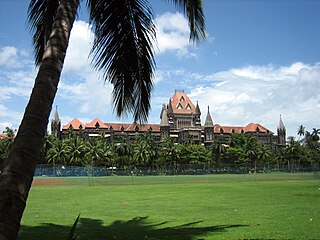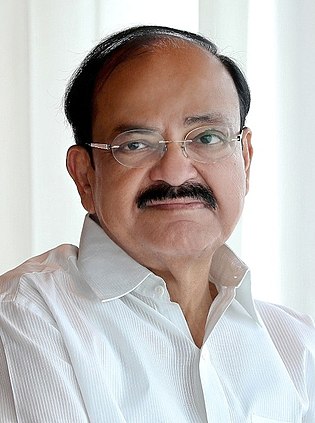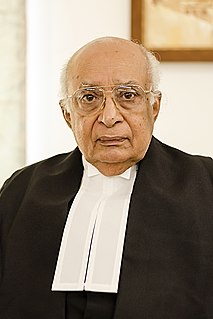
Justice Vaidyanathapuram Rama Krishna Iyer was an Indian judge who became a pioneer of judicial activism. He pioneered the legal-aid movement in the country. Before that, he was a state minister and politician. As an activist lawyer, he served jail terms for the cause of his poor and underprivileged clients. He was seen as an ardent human-rights activist. In addition, he campaigned for social justice and the environment. A sports enthusiast and a prolific author, he was conferred with the Padma Vibhushan in 1999. His judgements continue to be cited in the higher judiciary.

The Supreme Court of India is the supreme judicial body of India and the highest court of the Republic of India under the constitution. It is the most senior constitutional court, and has the power of judicial review. The Chief Justice of India is the head and chief judge of the Supreme Court, which consists of a maximum of 34 judges and has extensive powers in the form of original, appellate and advisory jurisdictions.

The National Human Rights Commission (NHRC) of India is a statutory public body constituted on 12 October 1993 under the Protection of Human Rights Ordinance of 28 September 1993. It was given a statutory basis by the Protection of Human Rights Act, 1993 (PHRA). The NHRC is responsible for the protection and promotion of human rights, defined by the act as "Rights Relating To Life, liberty, equality and dignity of the individual guaranteed by the constitution or embodied in the international covenants and enforceable by courts in India".

The High Court of Bombay is the high court of the states of Maharashtra and Goa in India, and the union territory of Dadra and Nagar Haveli and Daman and Diu. It is seated primarily at Bombay, and is one of the oldest high courts in India. The High Court has regional branches at Nagpur and Aurangabad in Maharashtra and Panaji, the capital of Goa.

The vice president of India, officially the vice president of the Republic of India, is the deputy to the head of state of India, the president of the republic. The Vice president is the second highest constitutional office after the president and ranks first in the presidential line of succession. The vice president is also an officer of the legislative branch of the Union Government as the chair of the Council of State.

The chief justice of India, officially the chief justice of the Supreme Court of India, is the chief judge of the Supreme Court of India as well as the highest-ranking officer of the Indian federal judiciary. The Constitution of India grants power to the president of India to appoint, in consultation with the outgoing chief justice, the next chief justice, who will serve until they reach the age of sixty-five or are removed by impeachment. As per convention, the name suggested by the incumbent chief justice is almost always the next senior most judge in the Supreme Court.

The Supreme Court of Pakistan is the apex court in the judicial hierarchy of Pakistan.
Section 377 of the British colonial penal code criminalized all sexual acts "against the order of nature". The law was used to prosecute people engaging in oral and anal sex along with homosexual activity. The penal code remains in many former colonies and has been used to criminalize third gender people, such as the apwint in Myanmar. In 2018, British politician Theresa May acknowledged how the legacies of British colonial anti-sodomy laws continue to persist today in the form of discrimination, violence, and death.

Hans Raj Khanna was an Indian judge, jurist and advocate who propounded the basic structure doctrine in 1973 and upheld civil liberties during the time of Emergency in India in a lone dissenting judgement in 1976. He entered the Indian judiciary in 1952 as an Additional District and Sessions Judge and subsequently was elevated as a judge to the Supreme Court of India in 1971 where he continued till his resignation in 1977.

Markandey Katju is an Indian jurist and former Supreme Court judge of India who served as chairman for the Press Council of India. He is the founder and patron of the Indian Reunification Association (IRA), an organisation that advocates for the peaceful reunification of what is now Pakistan and Bangladesh with India under a secular government.
The Indian Judiciary is a system of courts that interpret and apply the law. It uses a common law system, inherited from the legal system established by former colonial powers and the princely states, as well as some practices from ancient and medieval times.
Shanti Bhushan is an Indian politician and lawyer. He served as the Law Minister of India holding office at the Ministry of Law and Justice from 1977 to 1979 in the Morarji Desai Ministry. He is a senior advocate of the Supreme Court of India. He, along with his son Prashant Bhushan, was featured at 74th position in a list of the most powerful Indians published by The Indian Express in 2009.

A state of emergency was declared by President of Pakistan Pervez Musharraf on 3 November 2007 and lasted until 15 December 2007, during which the constitution of Pakistan was suspended. When the state of emergency was declared, Musharraf controversially held both positions of President and Chief of Army Staff. He later resigned as army chief 25 days into the emergency on 28 November. The state of emergency and its responses are generally attributed to the controversies surrounding the re-election of Musharraf during the presidential election on 6 October 2007, including his holding of both offices of President and Chief of Army Staff at the time.

The Provisional Constitutional Order Judges case, refers to cases heard and decided by the Pakistan Supreme Court pertaining to the High Court and Supreme Court judges who took their oath of offices under the Provisional Constitutional Order in 2007. On 3 November 2007, then-President Pervez Musharraf declared a Provisional Constitutional Order, which declared a state of emergency and suspends the Constitution of Pakistan. Under this emergency law, all High court judges, including the Supreme Court justices, were asked to take oath under this Provisional Constitutional Order. Those who didn't were placed under effective house arrest. A seven-member bench issued a restraining order on the same day, barring the government from implementing emergency rule and urging other government officials to not help do so.
Paul Daniel Dinakaran Premkumar was the Chief Justice of the Sikkim High Court. He resigned from the post following allegations of corruption and subsequent removal proceedings.

Sarosh Homi Kapadia was the thirty-eighth Chief Justice of India.

Kallupurackal Thomas Thomas is an Indian former judge who served on the Supreme Court of India and is known for his strong opinions on Indian socio-political matters. He was awarded the Padma Bhushan by the Indian government in 2007 for services in the field of social affairs.

The National Judicial Appointments Commission (NJAC) was a proposed body which would have been responsible for the recruitment, appointment and transfer of judicial officers, legal officers and legal employees under the government of India and in all state governments of India. The commission was established by amending the Constitution of India through the ninety-ninth constitution amendment with the Constitution Act, 2014 or 99th Constitutional Amendment Act-2014 passed by the Lok Sabha on 13 August 2014 and by the Rajya Sabha on 14 August 2014. The NJAC would have replaced the collegium system for the appointment of judges as invoked by the Supreme court via judicial fiat by a new system. Along with the Constitution Amendment Act, the National Judicial Appointments Commission Act, 2014, was also passed by the Parliament of India to regulate the functions of the National Judicial Appointments Commission. The NJAC Bill and the Constitutional Amendment Bill, was ratified by 16 of the state legislatures in India, and subsequently assented by the President of India Pranab Mukherjee on 31 December 2014. The NJAC Act and the Constitutional Amendment Act came into force from 13 April 2015.

The Madras High Court, officially renamed High Court of Tamil Nadu, is the second oldest High Court of India after the Calcutta High Court in Kolkata. It is located in Chennai, Tamil Nadu. The court is one of the three High Courts in India established in the three Presidency Towns of Madras, Bombay and Calcutta by letters patent granted by Queen Victoria, bearing date 26 June 1862. It exercises original jurisdiction over the city of Chennai and appellate jurisdiction over the entire state of Tamil Nadu and Union territory of Puducherry, as well as extraordinary original jurisdiction, civil and criminal, under the letters patent and special original jurisdiction for the issue of writs under the Constitution of India. Covering 107 acres, the court complex is one of the largest in the world, next only to Supreme Court of the United Kingdom, London.













